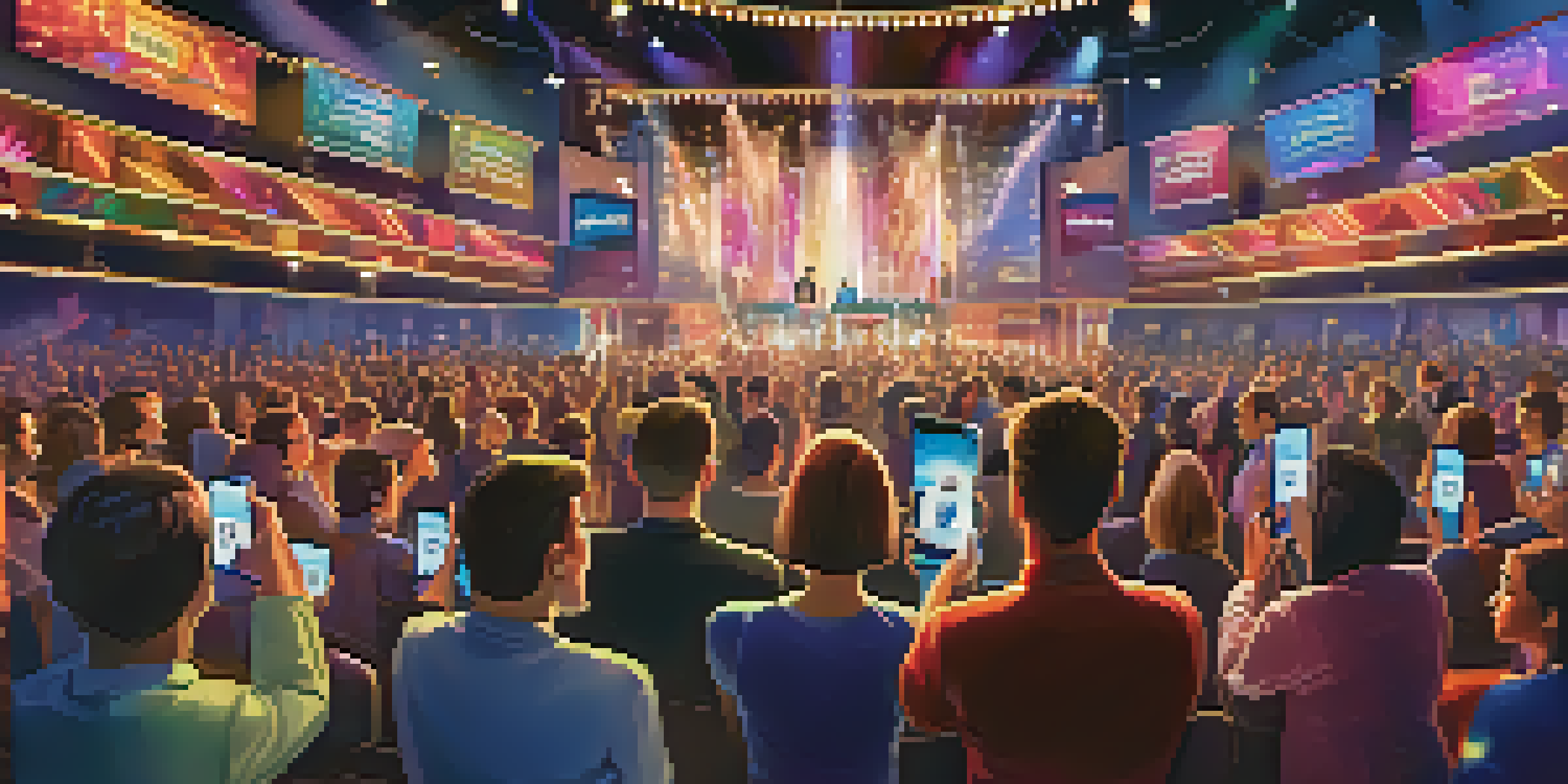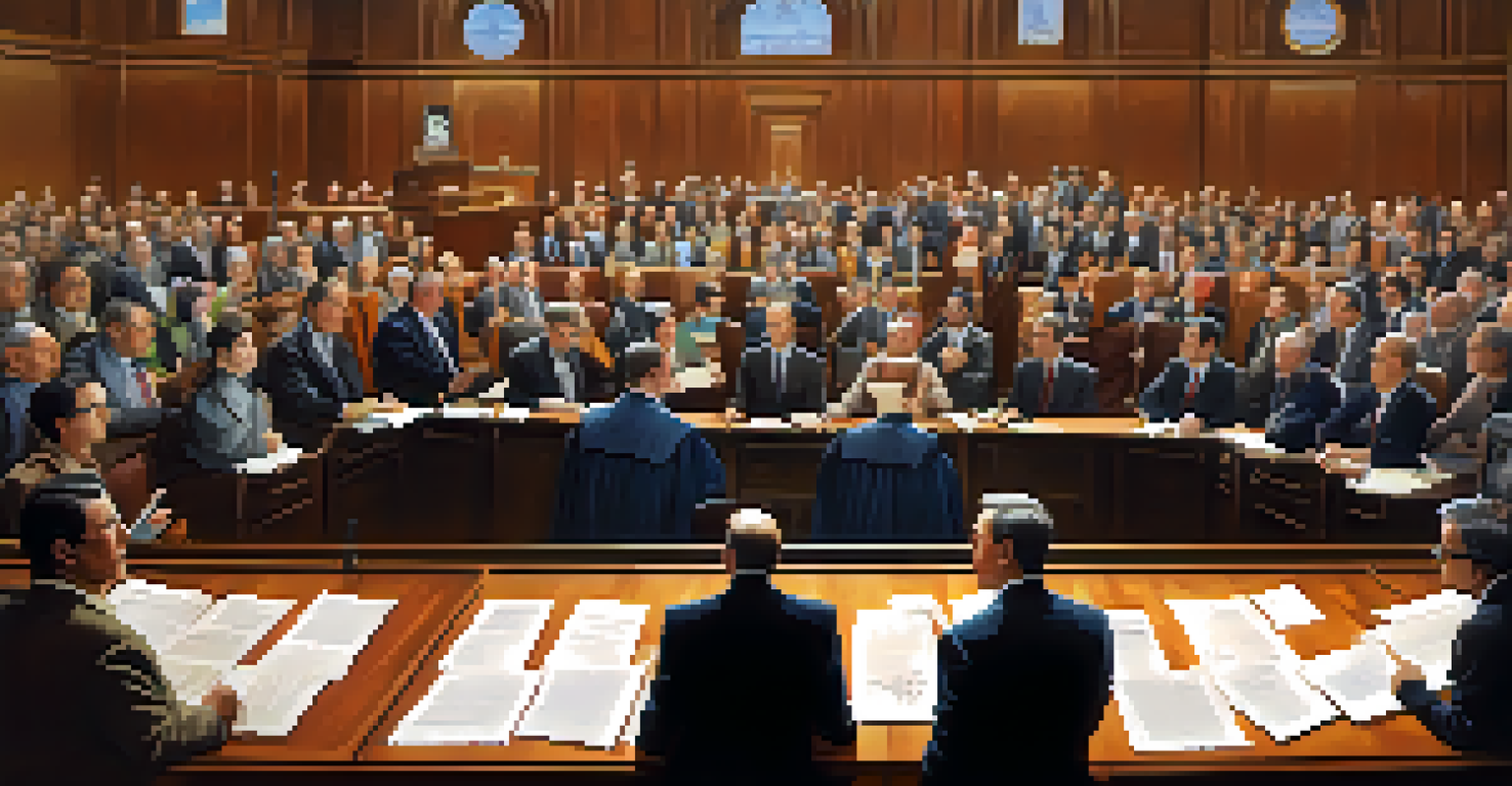How Audience Voting Impacts Award Show Outcomes and Trends

Understanding Audience Voting in Award Shows
Audience voting has become a significant part of many award shows, allowing fans to have a direct say in the outcomes. This process often involves online polls, text voting, or app-based systems, making it accessible to a wide demographic. By engaging viewers, award shows can create a sense of community and excitement, drawing in larger audiences and keeping fans invested in the results.
The power of the audience is undeniable; their votes shape the narrative and outcomes of our favorite shows.
One of the most notable examples of this is the American Idol competition, where viewers vote for their favorite contestants. This method of voting not only makes fans feel like they have a stake in the competition but also impacts the show's ratings and overall popularity. The more invested viewers are, the more likely they are to tune in each week, showcasing the power of audience participation.
However, audience voting also raises questions about fairness and the representation of artistic merit. While it can democratize the process, it may sometimes favor popularity over quality, leading to outcomes that spark debate among critics and fans alike.
The Impact of Social Media on Voting Trends
Social media platforms have transformed the way audiences engage with award shows, amplifying their voices and preferences. Hashtags and trending topics allow fans to rally support for their favorites, influencing the voting landscape in real time. This digital engagement creates a more vibrant atmosphere and can even sway the results, making social media a powerful tool in the voting process.

For instance, during the Oscars, platforms like Twitter and Instagram become buzzing hubs where fans express their opinions and campaign for their favorite films or performances. This online chatter can lead to increased visibility for certain nominees, affecting how people vote. The ability to mobilize support quickly can be a game-changer, highlighting the interconnectedness of social media and traditional voting methods.
Audience Voting Enhances Engagement
Audience voting fosters a sense of community and excitement, encouraging fans to invest in award show outcomes.
However, this trend also introduces challenges, such as the potential for organized voting campaigns or 'vote brigading,' where groups of fans may excessively vote for a particular nominee. This can skew the results and prompt discussions about the integrity of the voting process, reminding us that while audience engagement is vital, it also requires careful moderation.
Audience Voting vs. Expert Judging
The dynamics between audience voting and expert judging create an interesting tension in award shows. While audience votes represent popular opinion, expert judges often bring a level of expertise and critique that can highlight artistic merit. This duality can lead to diverse outcomes; sometimes, the audience's choice aligns with expert opinions, while other times, they diverge dramatically.
In a world driven by social media, the voice of the fans can echo louder than that of the critics.
For example, at the Grammy Awards, fans may vote for mainstream hits, while music critics might favor lesser-known yet artistically significant tracks. This discrepancy can spark discussions about what constitutes 'the best' in art and entertainment. The contrast between popular choice and critical acclaim ultimately enriches the conversation around award outcomes.
Balancing these two perspectives is essential for award shows to maintain credibility while keeping audience engagement high. As voting methods evolve, finding the right mix of audience input and expert judgment will be crucial for future awards.
Case Studies: Audience Voting in Action
Looking at specific award shows can provide valuable insights into how audience voting impacts outcomes. The People's Choice Awards, for example, are entirely driven by fan votes, celebrating the choices of the masses. This approach not only empowers viewers but also reflects popular culture trends, showcasing what resonates most with audiences.
Conversely, the MTV Video Music Awards (VMAs) also incorporate audience voting but blend it with industry expertise. This hybrid model allows for a broader representation of musical achievements while still prioritizing fan engagement. The results often lead to surprises, with unexpected winners capturing the spotlight due to passionate fan support.
Social Media Shapes Voting Trends
Social media platforms amplify audience voices, influencing voting outcomes and creating a dynamic interaction between fans and nominees.
These case studies highlight the varying degrees of audience influence across different platforms, revealing both the strengths and weaknesses of voting systems in award shows. Understanding these patterns can help predict future trends and outcomes in the entertainment industry.
Changing Trends in Audience Voting
Trends in audience voting are continually evolving, influenced by technological advancements and changing viewer preferences. The rise of mobile apps and real-time voting systems has made participation more accessible than ever. This shift not only increases engagement but also reflects the growing importance of immediacy in our digital age.
Moreover, the emergence of international voting systems has opened doors for global fan bases to participate. Shows like the Eurovision Song Contest exemplify how audience voting can transcend borders, creating a unique cultural exchange. This globalization of voting trends allows for a richer mix of influences and perspectives in award outcomes.
As these trends develop, award shows must adapt to remain relevant and resonant with their audiences. Keeping pace with technological and cultural shifts will ensure that audience voting continues to be a meaningful part of the awards process.
The Role of Fan Campaigns in Voting
Fan campaigns play a crucial role in shaping award show outcomes, often coordinating efforts to rally support for their favorites. These campaigns can include social media drives, petitions, and even organized voting parties, all aimed at boosting visibility and votes for specific nominees. The collective enthusiasm of fans can significantly impact results, showcasing the power of community engagement.
For example, the #JusticeFor[Nominee] campaigns have become common in recent years, where fans advocate for overlooked artists or films. These grassroots movements not only highlight the passion of the fans but also demonstrate their ability to influence award outcomes. Such campaigns reflect the evolving landscape of award shows, where viewer engagement can lead to real change.
Balancing Popularity and Expertise
The tension between audience voting and expert judging highlights the complexities of defining artistic merit in award shows.
While these fan-driven efforts can invigorate interest, they also raise questions about the fairness of the voting process. The intensity of organized campaigns may overshadow individual votes, prompting discussions about how to balance enthusiasm with equitable representation.
Future Implications of Audience Voting
Looking ahead, the implications of audience voting on award shows are vast and complex. As technology continues to advance, we can expect even more innovative ways for fans to participate in the voting process. This could lead to more interactive formats, where viewers can engage in real-time discussions and make their voices heard instantly.
Moreover, the growing emphasis on diversity and inclusion in the entertainment industry will likely influence voting trends. Award shows are becoming more attuned to the voices of underrepresented communities, and audience voting can be a powerful tool for amplifying these perspectives. This shift may not only change who wins but also how we define success in the industry.

Ultimately, the future of audience voting in award shows will depend on the ability to balance engagement with integrity. Ensuring that the process remains fair and representative will be key in maintaining the trust of both fans and industry professionals alike.